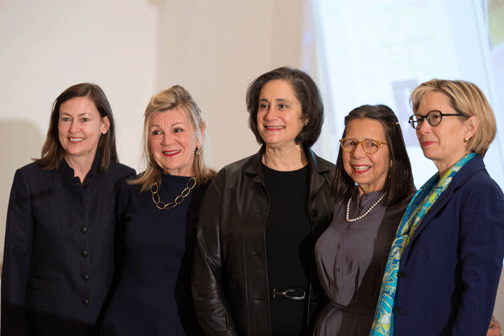On January 9, Director Susan Fisher Sterling accepted the Simone de Beauvoir Prize for Women’s Freedom on behalf of the National Museum of Women in the Arts, during a ceremony at Musée d’Art moderne de la Ville de Paris. As the first U.S. organization to be presented this prestigious award, NMWA joins the company of recipients such as Pakistani education activist Malala Yousafzai and Russian novelist and civil rights activist Lyudmila Ulitskaya, honored for their contributions to women’s rights and free speech.

The prize, which has been awarded since 2008, was created to mark the 100th anniversary of the birth of feminist philosopher Simone de Beauvoir (1908–1986). It honors women, men, and associations who, in the spirit of Simone de Beauvoir, fight to defend women’s rights wherever they are comprised. Chaired by Josyane Savigneau (writer and journalist for Le Monde), with founding president Julia Kristeva (professor at Paris Diderot University, writer, and psychoanalyst) and Sylvie Le Bon de Beauvoir (honorary president), the jury is composed of public figures from the world of arts and literature.

During her acceptance remarks, Sterling said, “We recognize the significance of this award and deeply appreciate the jury’s selection of NMWA for its dedication to foregrounding women’s free expression and filling the void in the recognition of women artists, past and present.”
She discussed the museum’s mission and its worldwide committee-based network of volunteers and supporters, which had brought it to the attention of the jury. NMWA’s committees, Sterling said, “aid in promoting the museum’s message of equity for women through excellence in the arts. It is thanks to Les Amis du NMWA that I am here before you today and it is my pleasure to share the credit for this award with them today.”
The award ceremony in Paris occurred only two days after the attack on the satirical newspaper Charlie Hebdo and the same day that its perpetrators were killed in a related hostage incident. Sterling expressed her condolences, saying, “To you, who are active in the French press, cultural, and academic communities, we offer deepest sympathy. This tragedy reminds us that cultural expression has real power. It is one of the most visible and creative aspects of free societies, and must be safeguarded.”

These somber events underscored the importance of advocacy for equality and creative expression in the tradition of Simone de Beauvoir. Sterling acknowledged the generations of artists, art historians, critics, and curators whose work continues to provide inspiration for the museum and its mission. She noted, “I don’t believe it is an exaggeration to say that it is thanks to the space created for women’s creative projects by Simone de Beauvoir’s writings that our museum exists today.”
